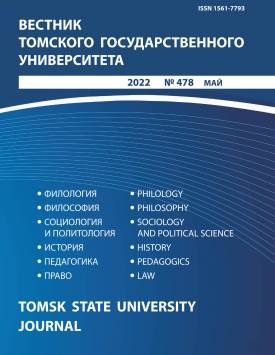Specifics of assessing adult foreign language training for intercultural and interethnic communication
The article deals with the problem of adults' language teaching for intercultural communication. The novelty of the work lies in the scientific substantiation of the priority of the development of adults' cultural identity. The authors determine its levels and the possibility of its development with the introduction of an ethnically oriented approach. International relations, the language policy of the state, the high degree of Russia's involvement in international cooperation, the expansion of interethnic contacts led to the social order of society for foreign language training and retraining of the adult contingent of students. In this article, the authors describe the structural content and highlight the levels of cultural self-identity of adult learners, and analyze the possibility of introducing the author's ethnically oriented approach into additional adult language education. In order to test the effectiveness of using the elaborated methodology for the development of cultural self-identity of adults on the basis of ethnically oriented, competence-based, communicative-cognitive, personal-activity and linguistic approaches, in the 2019-2020 academic year, the first series of experimental training was conducted for students of the Communicative English Course for Adults program at Nizhny Novgorod Dobrolyubov State Linguistic University. The classroom load was 120 hours. Adult education aimed at the development of cultural identity is based on the following approaches: competence-based, communicative-cognitive, personal-activity, linguo-cultural, ethnically oriented. Cultural self-identity has the following levels: initial, associative-analytical, verbal-analytical, and verbal-creative. The obtained results of experimental training indicate that the training conducted in the experimental group, which aimed at developing cultural identity for effective intercultural and interethnic communication, was successful. Based on the results of the experimental training, it can be concluded that the ethnically oriented approach developed by the authors has a positive impact on the development of the students' cultural identityy. It is necessary to build training on a contrast-comparative basis with the use of an ethnically oriented approach, using a set of exercises, which give adults a real opportunity to compare, analyze, mentally penetrate into the linguistic and cultural phenomena of their country and countries speaking the language adults study.
Keywords
interethnic communication, self-identity, ethnically oriented approach, continuing educationAuthors
| Name | Organization | |
| Oberemko Olga G. | Nizhny Novgorod Dobrolyubov State Linguistic University | ogoberemko@lunn.ru |
| Maliutina Elena A. | Nizhny Novgorod Dobrolyubov State Linguistic University | eamalutina@lunn.ru |
References

Specifics of assessing adult foreign language training for intercultural and interethnic communication | Vestnik Tomskogo gosudarstvennogo universiteta – Tomsk State University Journal. 2022. № 478. DOI: 10.17223/15617793/478/21
